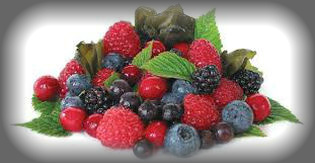| |
Ellagic Acid

|
Ellagic acid is a naturally occurring polyphenol compound found in plants, which it synthesizes from tannins and other chemical compounds. Ellagic acid is found in the highest concentrations in dark fruits, including blackberries, blueberries, raspberries, strawberries and pomegranates. In plants, ellagic acid provides natural UV protection as well as defense against bacterial and fungal pathogens. It is a powerful antioxidant.
Ellagic acid (EA) is a type of antioxidant referred to as a “polyphenol”. The most plentiful food sources of EA are blackberries, cranberries, pecans, pomegranates, purple/red grapes, raspberries, strawberries and walnuts. Some of the benefits of all of these fruits and nuts may be directly attributable to their EA content.
A brand new Korean study reported at the April 2009 Experimental Biology Meeting discusses the potential of a topical form of ellagic acid in the management of wrinkles. The study was set up in two separate parts:
1.The scientists first tested the effects of EA on human skin cells that were exposed to ultraviolet damage (a “sunburn” model).
2.A group of hairless mice, with skin characteristics similar to humans, were also exposed to excessive UV radiation over the course of 8 weeks. Half of the mice had EA applied to their skin daily.
The results of these experiments offer hope in the battle against premature skin aging. Here are the primary findings that were reported:
The human skin cells treated with EA showed signs of reduced inflammation. In particular there was a reduction in MMP (matrix metalloproteinase), a substance that contributes to the breakdown of collagen and leads to the coarsening of skin.
The mice who received high exposure to UV radiation developed thicker skin and wrinkles. The group of mice that had EA applied to their skin, while exposed to the same amount of UV radiation, exhibited fewer wrinkles.
Collectively, this evidence reveals that ellagic acid may combat wrinkles by protecting the collagen in skin tissue and reducing inflammation. In addition, it appears that EA also confers some protection against the harmful rays of the sun.
This adds to some promising research that was published in 2006 in the Journal of Investigative Dermatology. In that investigation, it was determined that ellagic acid may encourage more elasticity and suppleness in an aged skin model. The researchers of that paper suggested that EA could be used as a preventive measure against the “normal” changes that occur in aging skin.
Youthful looking skin may be one benefit of topical ellagic acid. But a more serious concern is that of skin cancer. A 1992 laboratory trial offers hope that ellagic acid’s benefits are more than just skin deep.
The study, published in the journal Basic Life Science found that ellagic acid (and other polyphenols found in similar foods) may inhibit skin tumors at various stages of their typical life cycle. This led the authors of the experiment to conclude that EA, “might be valuable in cancer therapy and/or prevention.”
There’s also some documentation about the dermatological benefits of orally administered ellagic acid. In 2006, a trial showed that an EA-rich pomegranate extract protected the skin of women exposed to slight sunburning conditions. The dosages used were 100mg, 200mg of ellagic acid a day or a placebo. During the course of the 4 week study, female volunteers using the EA all demonstrated evidence of UV protection. Similar results were also shown in an animal experiment from 2005.
Currently there are not a lot of ellagic acid creams and lotions on the market. In the future it’s likely that they’ll become more widely available. But it’s important to remember that virtually every aspect of health is impacted by diet. Incorporating foods and supplements that contain EA into a wellness routine may support the skin from the inside out.
Ellagic acid inhibits enzyme production in viruses, bacteria and fungi, preventing them from infiltrating and proliferating inside the body where they cause disease.
Ellagic acid can help protect skin from oxidative stress induced by UV radiation and the natural aging process.
A recent Korean study shows that ellagic acid applied to sun damaged skin (a mild sunburn) reduced inflammation. Such an effect may be due to ellagic acid’s ability to repress the effects of intercellular adhesion molecule (ICAM), a compound involved in the inflammatory response. Ellagic acid also inhibits matrix metalloproteinase (MMP), an enzyme that signals collagen breakdown. Together, these properties encourage the maintenance and/or improvement of the skin’s elasticity, which may result in the diminishing of fine lines and wrinkles.
But ellagic acid isn’t just a wrinkle fighter. As a tyrosinase inhibitor, ellagic acid is also an effective skin brightener. However, ellagic acid does not affect the DNA of melanocytes (the skin cells that produce pigment), making it a safer alternative other skin brightening ingredients like hydroquinone.
Disclaimer: The information presented herein is intended for educational purposes only. These statements have not been evaluated by the FDA and are not intended to diagnose, cure, treat or prevent disease. Individual results may vary, and before using any supplements, it is always advisable to consult with your own health care provider.
|
|


















